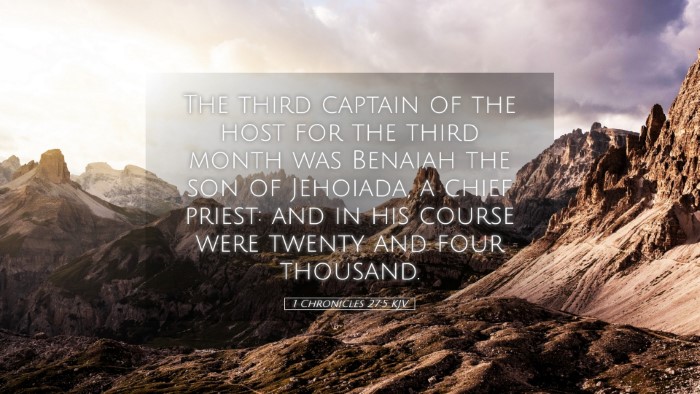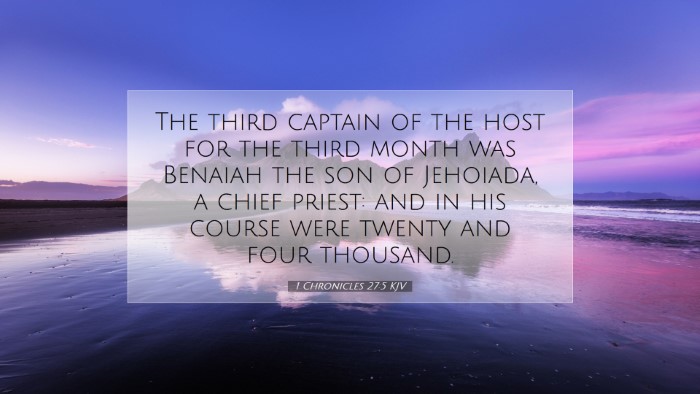Commentary on 1 Chronicles 27:5
Verse Text: "The chief of the captains of the host for the first month was Ishbaal the son of Zeruiah; and in his course were twenty and four thousand." (1 Chronicles 27:5)
Exegetical Insights
This verse serves as part of a larger enumeration of the military leaders in King David’s administration. Ishbaal, the son of Zeruiah, is mentioned as the chief of the captains for the first month, underscoring a systematic rotation of military duties among Israel's leaders. The number twenty-four thousand indicates a substantial force, highlighting the organization and readiness of the kingdom under David's rule.
Historical Context
The chronicler presents these details in a historical context that reflects the stability and governance of Israel. David's reign was marked by military campaigns and expansions, and a well-ordered military was essential for maintaining peace and securing territorial gains.
Commentary from Matthew Henry
Matthew Henry notes that during the time of David, there was an ordered arrangement of military leadership that signified divine wisdom in leadership. He emphasizes that Ishbaal being from Zeruiah, a sister of David, implies a combination of familial loyalty and military competence, reflecting God’s providential hand in appointing leaders. This suggests that relationships may impact administrative roles within God’s plan for Israel.
Insights from Albert Barnes
Albert Barnes highlights the significance of this verse in demonstrating the military organization that David established. He points out that the appointment of a captain for each month reflects strategic thinking for maintaining defense and readiness against threats. Furthermore, Barnes discusses how this systematic setup indicated not only military preparedness but also a reflection of David's capability as a leader to maintain order and structure.
Observations by Adam Clarke
Adam Clarke expounds on the names and numbers listed, noting that they were significant for understanding the leaders of the army and their duties. His commentary underscores that Ishbaal’s leadership and the reliance on their number (twenty-four thousand) show how careful planning was central to Israel's military successes. Clarke also relates this organization to spiritual leadership, suggesting that such order mirrors God's kingdom, where every member has a role and responsibility.
Theological Implications
This verse invites deeper reflection on the nature of leadership in the community of faith. The organization of military leaders under God’s appointed king serves as a metaphor for the Church. Just as David needed a strong military to protect Israel, the Church today requires leaders with godly wisdom to defend against spiritual adversaries.
Spiritual Leadership and Organization
The text encourages a structure within spiritual communities, where every member has purpose and function. Pastoral leadership can glean from this verse the necessity of order and structure in church governance. As David carefully assigned leaders to specific responsibilities, modern church leaders are called to delegate roles according to the gifts and calling of their members.
Covenantal Themes
In a covenantal context, the military organization reflects God’s promise of protection and support for His people. Each leader’s responsibility can be seen as a protective measure that God has ordained. This leads to a discussion on the faithfulness of God in raising leaders according to His own purpose, which resonates throughout the biblical narrative.
Summary for Application
This verse is more than a mere historical record; it reflects on the themes of divine order, leadership structure, and the necessity for preparedness within the people of God. For pastors and church leaders, it serves as a reminder of the importance of appointing and developing leaders. Furthermore, the organization exemplified here provides a model for effective ministry, reminding believers of their collective responsibility within the body of Christ.
Conclusion
As 1 Chronicles 27:5 captures a moment in Israel’s history, it also poses a challenge for contemporary faith communities to assess how they are structured and led. From the insights provided by public domain commentaries, it is evident that purposeful leadership is vital in fulfilling God’s plans within His covenant community.


